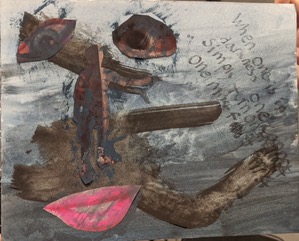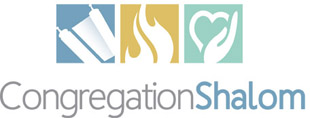Finding the Light: A Conversation About Mental Health
Keeping Connected В January 2020
Dear Friends,
Recently I was visiting an art class in our Chai School, where for the prior 6 weeks the students had been learning about collage. Their project was to take the techniques that they had learned and apply them to a subject matter that meant a lot to them. It could be a personal issue or theme, or something they cared about in society, in particular with a focus on Tikkun Olam. I was very moved by all of their art pieces; struck by the students’ creativity, but more importantly by the emotion that was present in many of their collages.
One collage was particularly powerful. Even before I knew what the student had in his mind during the creation, I felt haunted by the image. I asked him what he was trying to communicate and he said that he wanted to take the stigma out of talking about mental health and mental illness.В His simple statement and the way it linked with his image and the profound text that he had incorporated into the collage, was very moving; so moving, that I asked if I could take a photo of it.
Little did he know that his message felt very personal and that I have had many personal experiences facing the challenges and stigma of mental health problems in my family. I also was aware that many members of Congregation Shalom, spanning the spectrum of ages, В from adult, to teen, to children, had or were presently facing similar challenges. It is heart-breaking to know that so many people face such darkness and stress, and that these challenges are magnified by the sense of fear and stigma that pervades our society.
I felt that if this young man could make the effort to do something to break down these barriers, so too should I and so too should our community. The first thing I did was ask our member if it was okay to share his image, his words and his name. The young man said yes. This collage was created by Nathan Smith, a 10th grader at Congregation Shalom. On the collage is his important message: “When one is in darkness, one cannot simply turn on the light. One must find it first.”

So how can one find the light when one’s world feels jagged and unsafe; when the sense of hope feels like a vacuum? For me as a rabbi, I wonder about this question as well as these:
What can we do to support our members, whatever their age, when they face the challenges of depression, addiction, anxiety or any other mental health challenge? How can we support them so that they do not also have to feel the concern of letting others know what is going on? How can we provide resources and supports for people who are trying to help other family members? What can we do to nurture people spiritually as they wrestle with finding a sense of wholeness in their spirit? What can we do to provide a place of community where people can find support and resources?
One thing I know is that it will take more than just me to begin this conversation. If you or a family member have struggled with the challenges of mental illness or other emotional difficulties, and would like to meet to share your thoughts, I invite you to join us. If you are a health care professional and feel like you have insights that you can share, I invite you to join us. I do not know where the conversation will go. Perhaps we need to start support groups. Perhaps we will create listings of easily accessible mental health resources.В Perhaps we will simply start the conversation and let others know that our congregation is a safe place that has room for everyone.
I know that it can be difficult to share and learn from others about an issue that our society believes is taboo, but I would say it is a mitzvah to create openings for our members who need support.В Congregation Shalom should be a community where everyone feels welcome. We will be meeting on Thursday, January 23rd at 7:00 pm in the library. I hope it will feel like a safe place. If you want to reach out privately, please feel free to e-mail me at rabbi@congregationshalom.org or at 978-251-8515.
L’shalom,
Rabbi Shoshana M. Perry
